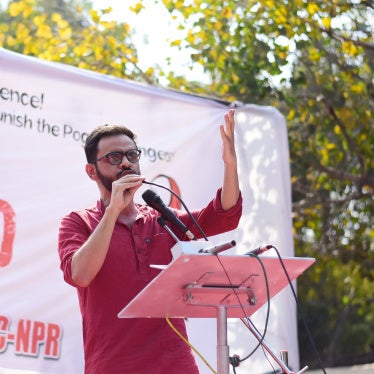Afghanistan’s media suffered its latest violent attack on June 10 when a bomb exploded at the offices of Pajhwok Afghan News, the country’s largest news agency, in the southeastern city of Jalalabad.
Pajhwok’s journalists were unhurt, though the attack wounded four guests at the nearby Voice of America office and damaged Pajhwok’s office equipment.
Nobody has claimed responsibility for the attack, but Pajhwok’s assessment of likely perpetrators illustrates the difficult conditions journalists face in the country as they are squeezed among different elements violently opposed to freedom of the media. Pajhwok’s director, Danish Karokhel, told Human Rights Watch that possible suspects include the Taliban, who have complained against Pajhwok for “reporting bias,” or some of Jalalabad’s criminal or militia elements whose business interests are threatened by media scrutiny.
Chief Executive Abdullah Abdullah aptly called it an attack on freedom of expression, although he and President Ashraf Ghani are failing on their campaign promise to protect Afghanistan’s media. Not only that, the government has placed increased restrictions on the kind of information the government can give to journalists. Reporters complain that they are prevented from reporting from some conflict areas, which means the destruction of civilian homes goes unscrutinized, as does high civilian and military casualty numbers.
Although the government recently scrapped the Media Violations Investigation Commission, which was used as a tool to unlawfully pressure journalists, it will be little comfort for journalists who are dismayed by the half-hearted implementation of the Access to Information Law.
Afghan journalists face violence and intimidation from all sides. Afghan officials, militia groups, strongmen, and insurgents have threatened, assaulted, and killed journalists since 2002 without any fear of prosecution. Media watchdog groups have recorded unprecedented and still increasing levels of violence against journalists. More than 80 percent of journalists surveyed by watchdog group Nai said conditions for freedom of expression had either worsened or remained the same – despite government promises to protect and support journalists.
In response to the attack on Pajhwok, Abdullah said he is committed to protecting journalists. It’s a promise we’ve heard previously both from him and Ghani, one that will ring hollow unless the government starts to live up to it.








